Thinking of taking an extended trip with the family and worried about how your kids or even your entire family will deal with maintaining their education or homeschooling on the road while you travel?
Are you putting off your dreams of exploring far off places for fear of schoolwork and activities your kids will miss out on while they’re gone?
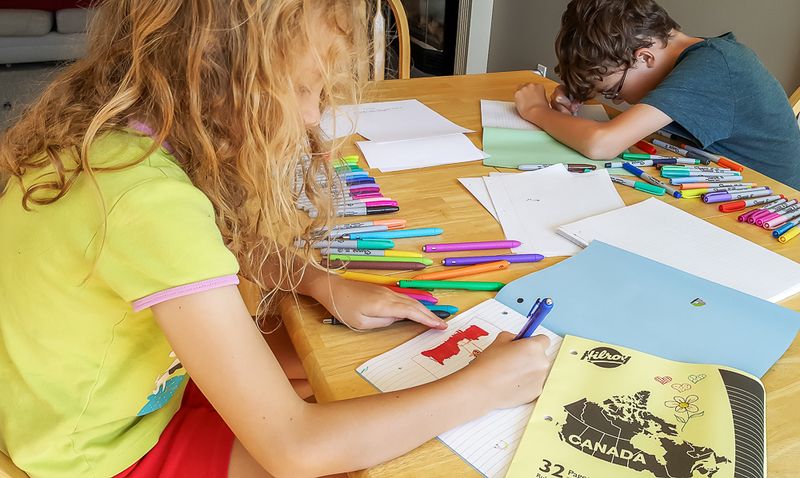
Have you fell in love with the notion of worldschooling your children to make them better global citizens but don’t love the idea of having to become their teacher as well as parent and now travel guide?
Not convinced that homeschooling while you travel will work for you but convinced that homeschooling and long term travel have to be synonymous?
Well, I can’t say how your kids or your family will deal with worldschooling, however, I can tell you about our personal experience with educating our kids while we travel the world.
Is worldschooling for everyone?
Before we answer that, I believe it’s important to define worldschooling. In its simplest form, worldschooling is getting an education while you travel, with an emphasis on incorporating your journey into the curriculum.
Traditional Worldschooling Methods
While there are many ways for children to get an education while they travel, this post talks about the most common ones we, and many of our fellow travel families, have explored over the years.
Homeschooling: Where the parent takes on the role of teacher and educates the child themselves, usually with a rough outline and somewhat keeping pace with standard curriculums.
Distance education, online learning or e-learning: Where your child is enrolled in a school, but taught at a distance with a teacher, usually online.
Unschooling: Where children learn through life experiences that you or they initiate without following any standard curriculum.
Local schooling: Where children enroll in either local schools or specialized schools in the area that they’re currently visiting.
How to become a worldschooler
This post is actually in response to an email we received from a concerned mom who wanted to break away from it all and travel the world, but was nervous that her kids would miss out on going to a normal school. She wasn’t sure that worldschooling her kids was for her.
We understand her concerns and probably yours if you’re reading this. We thought long and hard about travel with kids even before we started our own family. Considering Micki and I got engaged in Thailand and then later married in New Zealand while on a year long round the world trip, you can understand our desire to keep traveling once there were more than just the two of us.
Tip! If you want to travel and homeschool your children, look into the laws about homeschooling in your country. Some, like our home country of Canada, have relatively liberal homeschooling laws, but others, like Germany, have restrictions on homeschooling.
That said, we’ve traveled with our kids since they were babies, and though we once again have a home base in Canada, that wasn’t always the case. You see, we jumped around Canada and the world for years at a time.
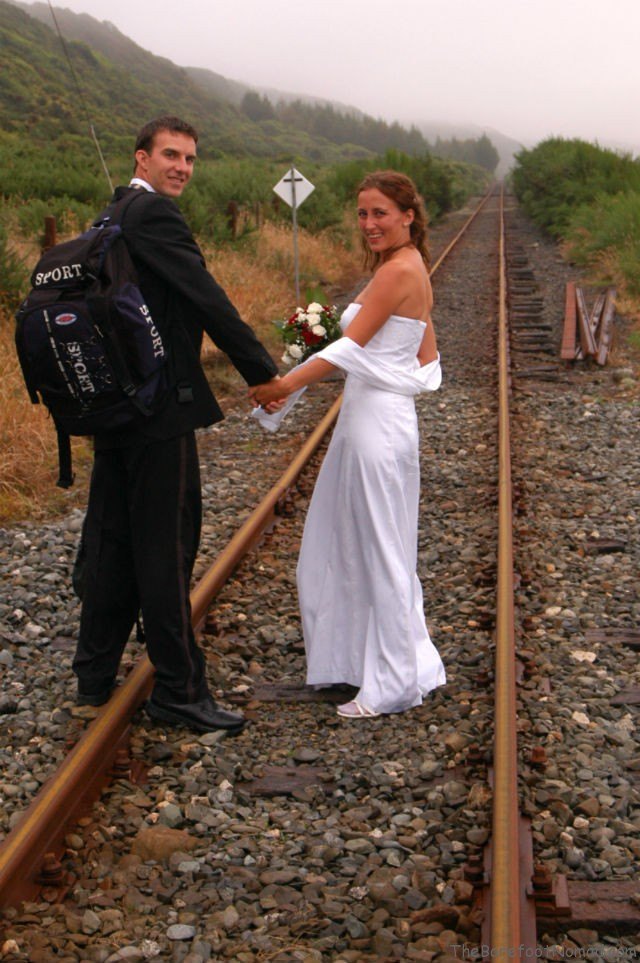
How We Homeschool on the Road
Once our kids were old enough, and we happened to be back in Canada for a stretch, we usually found ourselves enrolling the kids back into regular public school.
If we were gone for an extended trip, we would enroll our children into an e-learning distance education class where our kids would chat with a dedicated teacher from back home a few times a week and got assignments that way.
How we combine regular school and distance education online
In our province of British Columbia, Canada, this is called online distributed learning. It’s essentially distance education offered by our public school system. It’s a provincially accredited online K-12 program with the same curriculum as physical schools in our province.
Our kids were taught by a public school teacher employed by the online learning education department. This meant that they could go back into a regular, physical public school at any time, and be at pretty much the same place in the curriculum as other students from the grade. Many Canadian provinces offer something similar. There was no cost for this.
Typical weeks would see us emailing photos of their physical work to their teacher, and there was also some online work they had to do. As they get older and past the “learning how to write with a pencil phase”, more and more of their learning takes place online.
To stay connected, they would chat with their teacher via Skype, or by email when they needed additional help. Even though we were out on the road somewhere, our kids still roughly followed the same learning plan as they would in school back in Canada.
Unlike a lot of traveling families, we’ve never officially homeschooled our children or even unschooled them. It wasn’t that we didn’t believe in it, it’s just that neither of us ever wanted to be teachers, and for the duration of our travels we were lucky enough to have an online version of our public school curriculum. It also didn’t hurt that there was no charge, and that Canada ranks as one of the best public school systems in the world.
The nice part about e-learning, or distributed online learning as it’s called here in British Columbia, was that they still had a teacher that assigned and checked their work. We were strictly the helpers who made sure the kids completed their assigned tasks. Of course, we were also always on hand if they needed help and support.
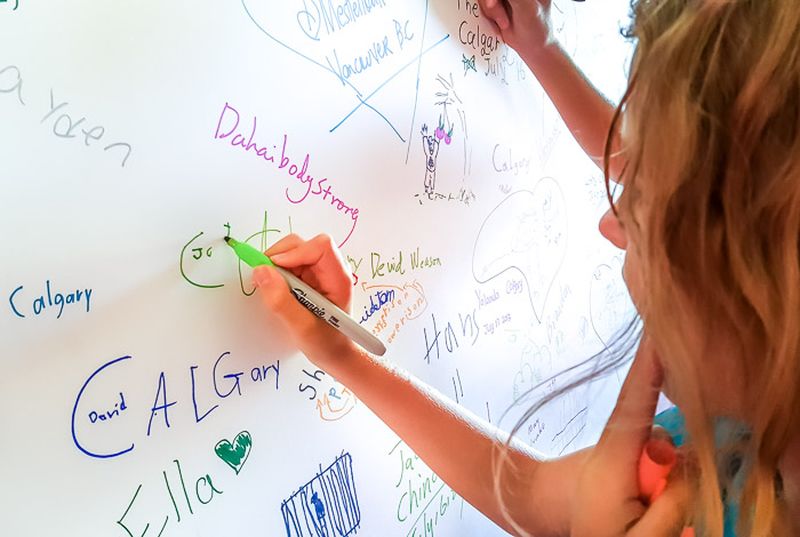
A few bonuses to online distance education while you travel
To be honest, being able to be there for our kids is one of the biggest pluses to what we do. When you travel extensively together, you have way more hours together as a family than regular 9 to 5 working parents have.
If you enjoy your you time, don’t become a long term traveling family. You’ll likely get tired of always being together.
Luckily for us, we’ve always enjoyed spending time with each other, so our lifestyle generally works well for us.
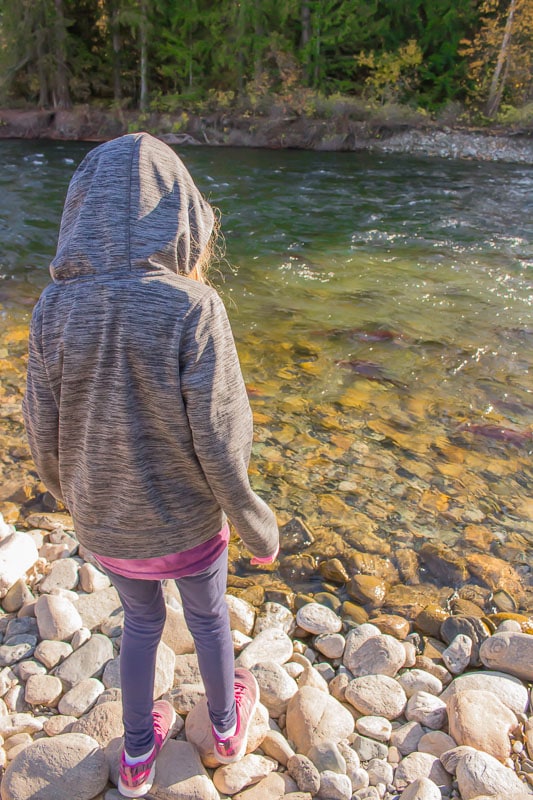
The greatest part about following a more standard education while we travel is that we can still work, research our next move, and enjoy wherever we happen to be without also having to make sure our kids learn the basic necessities they will eventually need in life like reading, spelling and math. Having a teacher guide them also forced us to not completely ignore their schooling since, for the most part, assignments and timelines were out of our hands.
In truth, that alone kept us honest, otherwise I know a more traditional education would have faltered if it was dependent on us finding the time to create, assign, then mark their schoolwork while on the road.
World Schooling via e-learning
A cool aspect about the Canadian e-learning classes they took was that the teacher, used to dealing with students on the move around the world, would often assign projects based on where we were.
For example, our kids learned about democratic history while we were traveling in Greece, the home of democracy itself. Our son Cole was especially interested in how governing bodies are formed and who gets a say in a country’s development.
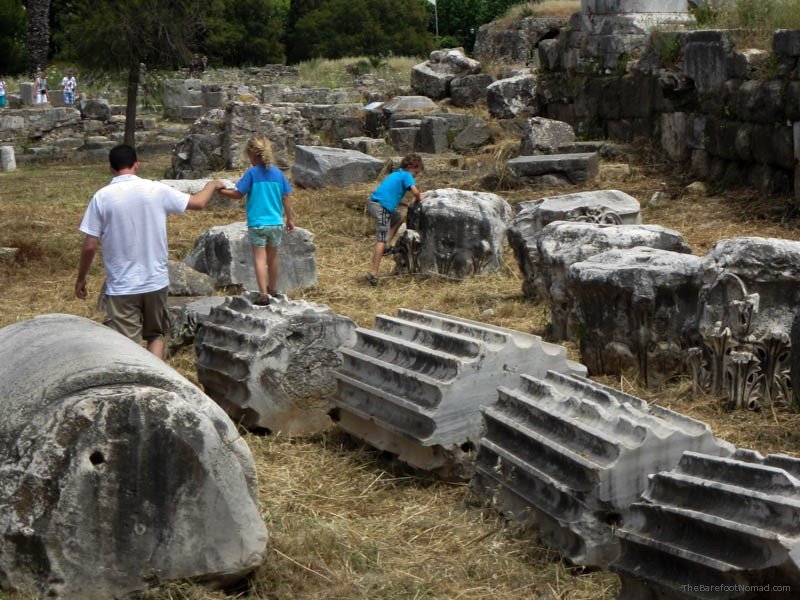
That trip they also learned about the Age of Exploration in Portugal while walking the same cliffs that Henry the Navigator walked on while ushering in the European expansion to Africa, China and the new world in the 15th century. The names of Dias, Gama, Columbus, Magellan, Drake and Vespucci became part of their world and gave our kids courage in exploring their own world.
Even while on holiday exploring the Mayan ruins in Mexico, our kids studied ancient civilizations and their effect on societies today. As a bonus, they also became experts on chocolate and can tell you exactly how cocoa beans were originally harvested and how they go from fruit to finished product.
In terms of culture, after watching the flamenco being performed in Spain, our kids and their teacher decided to learn about different dance and music styles around the world and, having a multi cultural dance off with your kids, is nothing short of fun.
More recently, last year, while we were exploring the Galapagos Islands, they learned about Darwin and his theories of evolution. That same trip, they learned about the Amazon rainforest and it’s effects on global weather before we had the opportunity to visit the Amazon for ourselves and see it firsthand on our Ecuador Amazon tour.
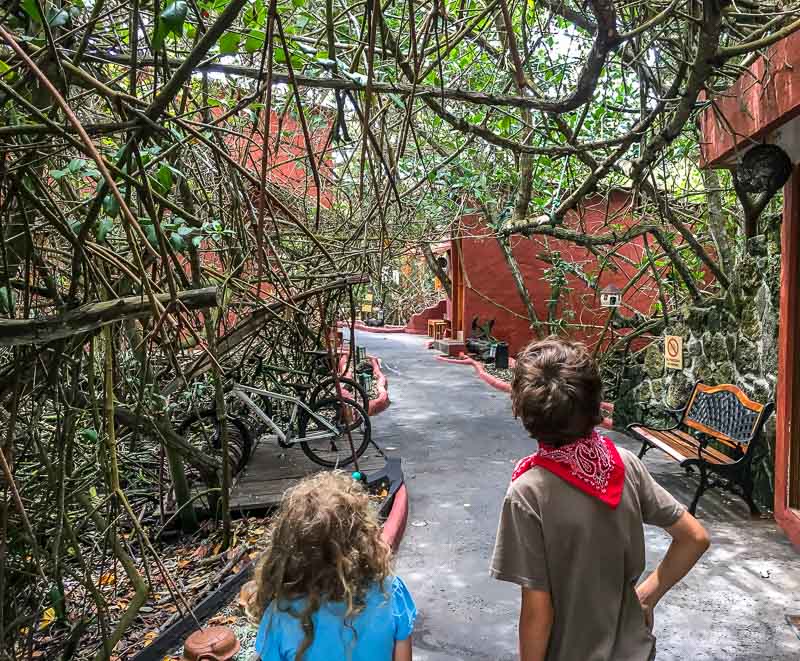
Worldschooling regardless of education
No matter where in the world we’ve gone, we’ve tried our best to tie the kids learning with where we were currently staying. We like to think that it has spurred their imaginations and made them more aware of how we’re all connected.
Though some of that learning was spurred on via a teacher, it’s not to say that when we happened upon an interesting place, event or historical figure that we wouldn’t do our own research as a family.
The truth is that learning new things, seeing different cultures, embracing different ideas and exploring the world around us all come hand in hand with long term travel. Let’s face it, if we didn’t already have an innate curiosity to our world, we wouldn’t be traveling anyway.
Travel as a learning tool
In terms of education, just being in a foreign location is enough to spur curiosity and learning. For instance, our kids learned Spanish while traveling through South America and their curiosity about marine animals was peaked while snorkeling with sea turtles and sharks in Belize which, in turn, lead to plenty of reading about marine life and habitats.
Even our trip to Harry Potter World at Universal Studios was a result of our daughter (who was eight when we went) reading the entire seven-book Harry Potter series while we traveled. Now, it’s not conventional learning, however her reading speed and vocabulary improved a lot because she wanted to read the complete series as quickly as she could. (See our Wizarding World of Harry Potter tips here).

Homeschooling on the road
I honestly can’t talk a lot about homeschooling on the road, however, we have friends who have gone that route and their kids seem to do well. Some have even pulled their kids in and out of different schools around the world while homeschooling as they moved from one place to another.
It’s interesting to read that many studies these days conclude kids actually do better with homeschooling (if done in a structured form) than traditional schooling. See this article from Gwen Dewar, PhD for a helpful look at homeschooling outcomes.
Homeschooled kids get much more one on one time and frankly, even though their school days are a often few hours rather than an entire day, they seem to retain what they learnt better than children in traditional classes. Homeschooling may also get them past their awkward adolescent stages easier since they don’t tend to get caught up in typical school drama such as bullying or peer pressure.
We decided a few years ago that a more standard education, coupled with our own self-driven desire to learn and seek out new worldwide experiences would work for us and so far it has. Our kids do well both in school and out when we’re on the road. There’s even a name for this type of homeschooling and traditional schooling mix: it’s called hybrid homeschooling, and it’s becoming increasingly popular.
Going to school in a foreign country
The beauty of travel is that you can put your kids into schools around the world or continue to teach them yourself. So many more parents are traveling today that there are way more options than even a few years ago.
For instance, we have some American friends living in Spain who put their kids right into the Spanish school system without knowing more than a few words in Spanish. The first few weeks were awkward for them, but they were soon fluent in Spanish and thriving in their new school environment. You can find out more of Heidi and Alan’s story on their blog, Wagoner’s Abroad.
It’s just more proof that you don’t need to follow any set rules while long term traveling. That’s the beauty of it all.
We’ve even taken our kids out of school for three months and without signing up for e-learning. Both their principals and teachers were aboard. We learned the basics of what they were going to teach in that time frame and just taught it ourselves as we went. It was probably the closest we’ve ever actually came to homeschooling, and when the kids got back it only took them about a week to fully catch up and keep going.
Education matters, exactly how, not so much
The truth is that your kids will likely be fine no matter what you choose as long as you cater to their educational needs and make it a point that they continue to learn as you travel.
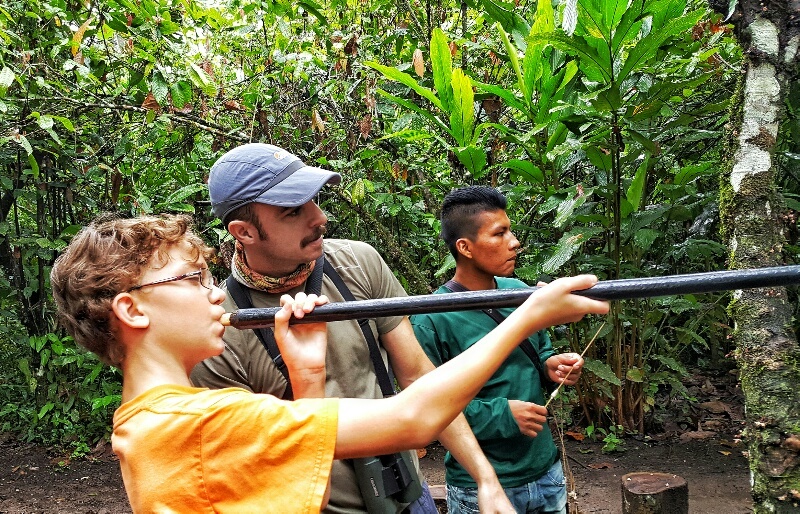
The negatives of worldschooling
While there are many bonuses to worldschooling, of course there are a few negative ones as well.
For instance, if you take them out of school for long term travel then yes, they may miss their friends and a few birthday parties. They might even miss some memorable class moments however it’s highly likely their new travel memories will stick in their mind for the rest of their life rather than for the rest of the year.
The bonus of growing up today in the digital world is no matter how remote you travel, if you need to connect, your friends and family are likely just a quick call away.
If your kids are into a lot of extra curricular activities like sports or music, then yes, the new life paradigm will be an adjustment for everyone. The good news is that a lot of sports are universal and there’s always new sports to learn wherever you happen to be. Music is the same. Each country has their own music and learning about them has always been one of our children’s biggest travel draws.
The benefits of worldschooling
Yes, there might be a few things your kids might worry about when they leave the safety and comfort of their everyday lives, however, to us and our children at least, the benefits of long term travel outweigh all the negatives.
When kids travel, they will see and do things that stay with them for a lifetime. It’s also likely they will be more mindful of other cultures and ethnicities. They will witness for themselves both the hardships and the beauty that other people in the world experience. They will hopefully also realize that the biggest things holding them back from doing anything in life is themselves.
I only wish that more families and more kids could travel so that everyone had a bit of worldschooling. I truly think the world would be a better place if we could all walk in another cultures footsteps, if only for a while, and try to see the world from a global standpoint rather than only a regional one.
Are you dreaming of extended travel?
If you’re looking into educating your kids via worldschooling during an extended trip abroad, I wish you good luck with whatever decision you make and wherever you choose to make it.
If you go, know that there are tons of websites with useful information out there, as well as Facebook groups that will let you meet up with similar traveling families. We’ve made some great friends that way and there’s tons of valuable advice from other families on the move as well.
The greatest part about travel is that you can go or stay as long as you want. There are no rules. If you want to move to London, Bali or Rio for a year, you can make it happen. If you’re tired of travel, you can also settle down right where you are or stop someplace else. Your kids will adjust and most will thrive however, how you go about their education is up to you.
Long term travel with a family is about options, choice and change. If you think that’s a good thing to teach your kids then start packing your bags.
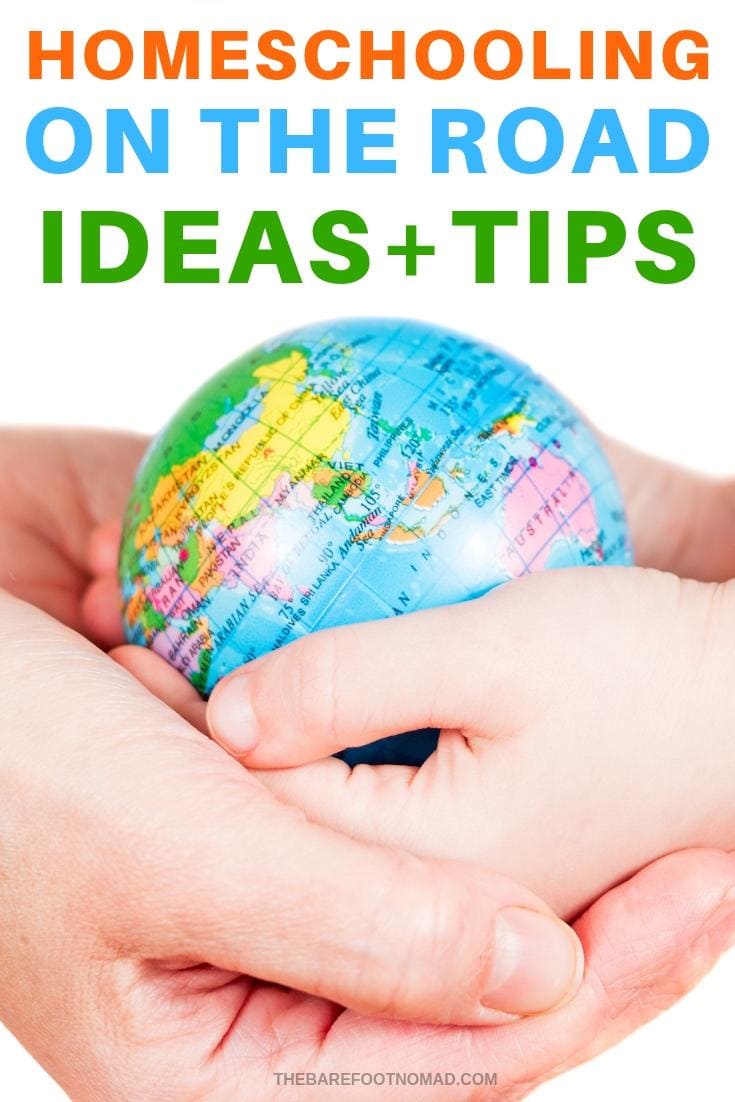
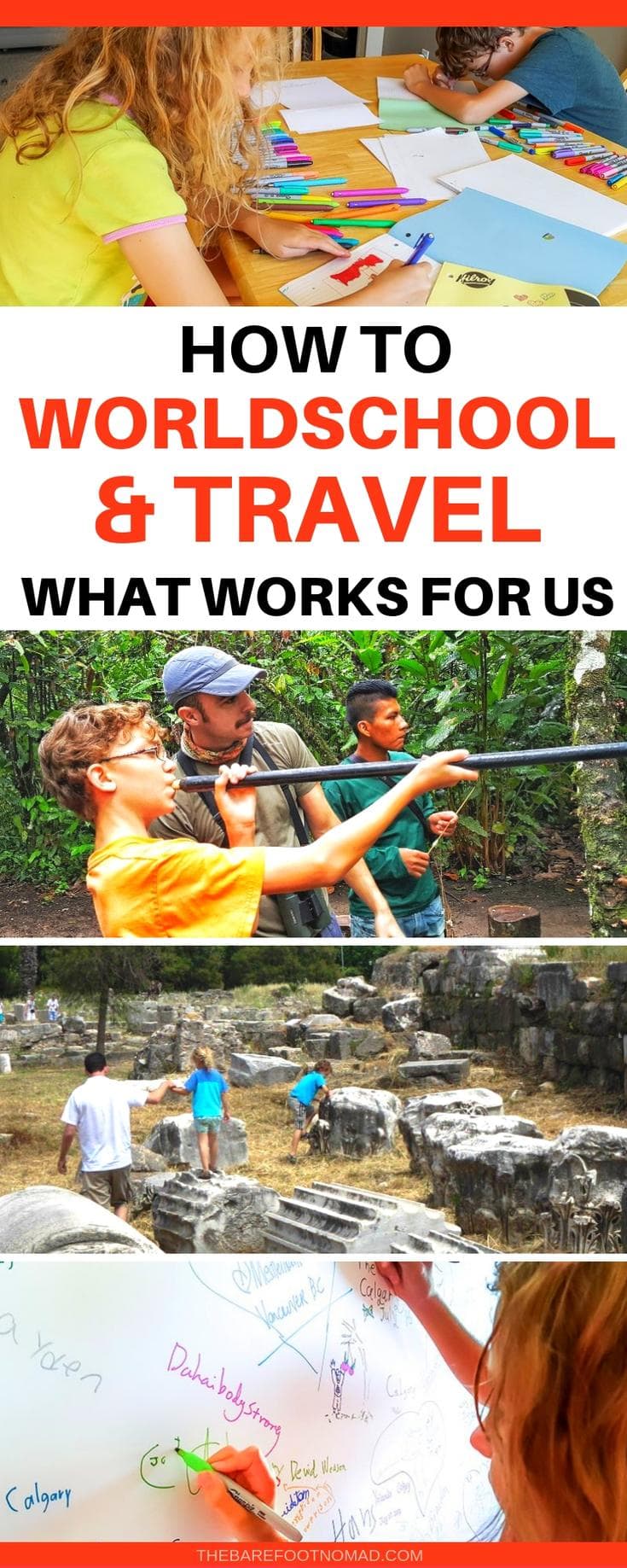
As long as you make education a priority, they will learn what they need to whether that’s at home in a regular school system, through e-learning or through homeschooling and, if your kids are learning anything while you travel, they’re worldschooling regardless.

